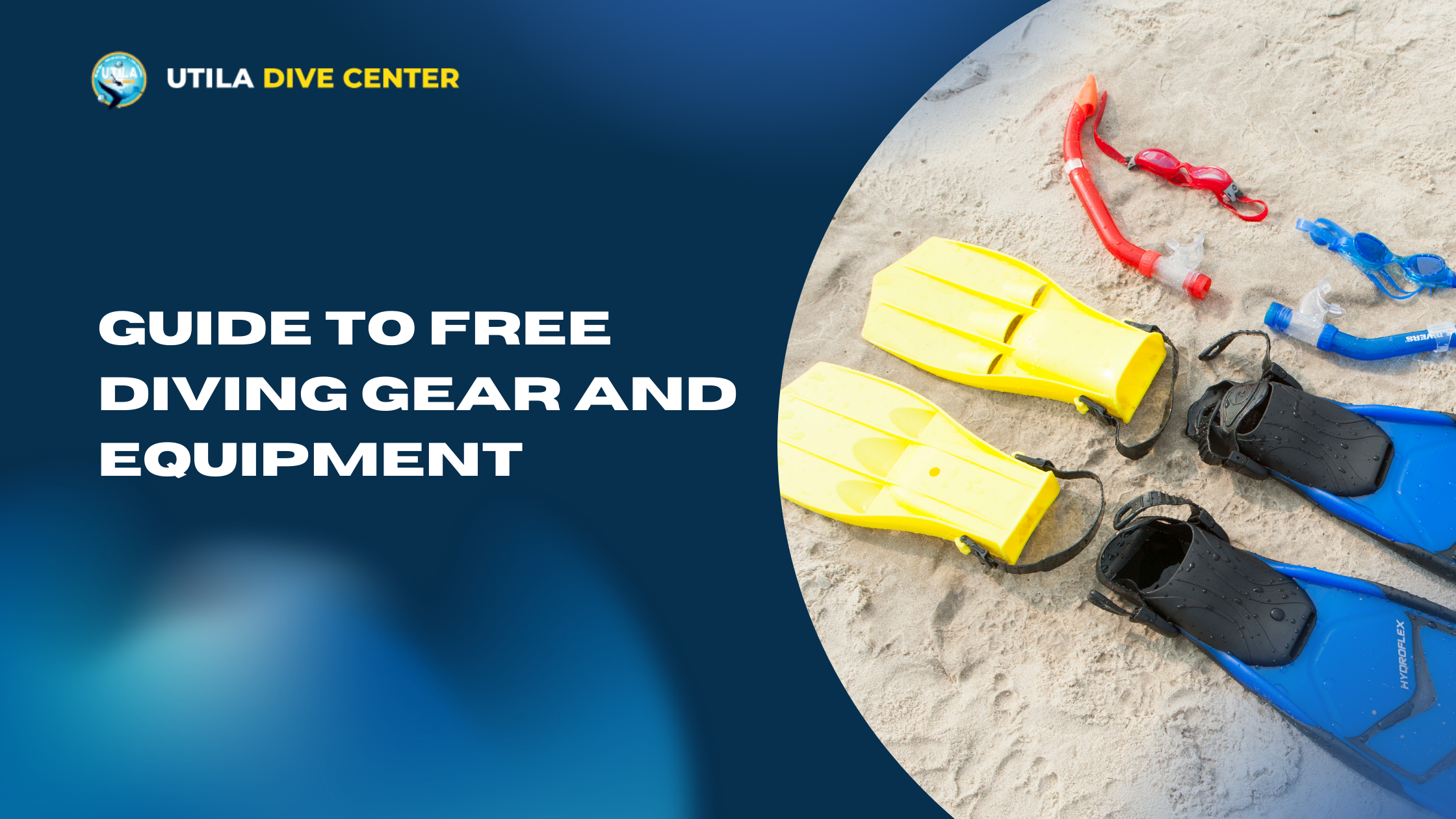
Guide to Free Diving Gear and Equipment
A Complete Guide to Free Diving Gear and Equipment
By: Manny Lagos | Date: 2025-05-16T05:23:35.540Z
Do you want to experience the thrill of diving beneath the waves on a single breath? Freediving lets you do just that AND also helps you build a deeper connection to the ocean. How amazing is that?
While you don’t need a tank, regulator, or buoyancy control device to freedive, you still can’t jump in without a few essentials.
So, why is it that important to get the right gear and which freediving equipment should you actually invest in?
Let’s find out.
The Importance of Free Diving Gear
Freediving equipment isn’t just about looking the part– it’s about enhancing your safety, comfort, and efficiency underwater. Believe us when we say, the right gear can be the difference between a disastrous dive and an unforgettable one.
At Utila Dive Centre, we’ve spent more than 20 years perfecting freediving techniques, and we’re here to break down the must-have freediving gear that will help you freedive like a pro!
Masks and Snorkels
Your mask is one of the most important pieces in your dive bag– if it doesn’t fit right, your dive won’t feel right.
A good freediving mask should have:
- Low volume (less air space) to make equalizing external pressure easier as you descend.
- A soft, comfortable silicone skirt to create a watertight seal without pinching.
- Tempered glass lenses for clear vision.
Brownie points if you find one with an anti-fog coating!
Now, let’s talk about snorkels. The best snorkels for freediving are typically simple by design– they don’t have any fancy valves, just a comfortable mouthpiece to make long dive sessions much more enjoyable.
Pro tip: Get a snorkel with a flexible tube so that you can tuck it into your freediving suit when not in use. That way, it won’t trouble you during your dive.
Free Diving Fins: Maximizing Underwater Propulsion
Think of freediving fins as your underwater power engine– they help you conserve energy and move effortlessly through the water. Freediving fins are generally longer, more flexible, and give you maximum underwater propulsion with minimal effort.
They come mainly in two types:
- Plastic fins – Durable, pocket-friendly, and perfect for beginners.
- Carbon fiber fins – Lightweight, high-performance, and great for advanced divers who’re looking for smoother kicks.
Blade length and stiffness of the fins also play a major role in the kind of dive you have. Longer blades typically mean more propulsion, whereas softer blades provide an easier, more relaxed dive. If you're just dipping your toes in the water, go for medium-stiffness fins. They strike just the right balance between comfort and power. And don’t forget to pair your fins with fin keepers– they’ll ensure your fins stay securely locked in place throughout your dive.
Wetsuits and Thermal Protection
Even in the tropical waters of Utila, staying warm is essential if you want to have a great freedive. A well-fitted freediving wetsuit not only keeps you cosy but also protects your skin from the occasional stings and scrapes. After all, who wants to cut a dive short over a jellyfish encounter?
The best part, though? Freediving wetsuits are generally made from smooth, stretchy neoprene that not only reduces drag but also keeps you streamlined. It fits you like a second skin.
Thickness matters too. In mostly pleasant climates like Utila, a 3mm freediving wetsuit is perfect, but if you’re going for longer dives or jumping in colder waters, you might want to get a 5mm suit. The key? A comfortable, snug fit.
Neoprene Socks and Gloves
Carrying Neoprene socks and gloves is a smart move if you’re diving in colder waters.. Why, you ask? Because your extremities (hands and feet) lose heat, very quickly. Neoprene socks provide extra cushioning for your feet, and the gloves protect your hands from sharp rocks or prickly coral. Moreover, the extra layer of warmth also allows you to go for deeper dives beneath the waves.
When you go shopping, make sure the thickness of the socks matches your fins. Thicker socks = tighter fit (you might need to size up in that case). As far as gloves are concerned, they should be snug but flexible– you should be able to handle your dive computer underwater.
Dive Computers and Safety Gear
When it comes to freediving, safety is paramount. A dive computer is one of the best tools to help you track your dive time, depth, and surface intervals. Freediving doesn’t involve the same risks as SCUBA diving, but it’s still important to pay attention to your stats and stick to safe limits. So, it’s important to look for a dive computer with user-friendly controls and an easy-to-read display. Good news? Some latest models sync easily with your smartphone allowing you to analyze your dive data afterwards.
Other safety essentials you can carry are:
- Dive knife
- Surface marker buoy (SMB)
- Whistle
- Audible signalling device
- Lanyard
- Weight belt
- Nose clips
The ocean is unpredictable, so it’s always better to be safe than sorry.
Choosing the Right Free Diving Gear for Your Needs
Choosing the perfect freediving equipment isn’t a one-size-fits-all solution– it all boils down to your skill level, personal comfort, and the dive environment.
As a beginner, you may go for cost-effective options. Experienced freedivers on the other hand, often invest in advanced gear such as pro-level masks or high-performance carbon fiber fins. However, your gear should always fit well, and feel comfortable, no matter your skill level.
Next, think about where you’ll be diving. Is it in the warm, tropical waters of Utila? Then you only need a thin wetsuit or just a rash guard, but if you’re diving into colder waters, you’ll want a thicker wetsuit to stay cosy and comfortable.
Bottom line? Try out gear before you buy and find what works best for you, not what’s trending.
How to properly clean and store your gear
Now, choosing the right freediving gear is relatively easy– the real challenge is keeping it clean and well-maintained to ensure longevity and peak performance. Proper care takes a little extra effort, but trust us, it’s definitely worth it!
Here are some simple steps to keep it in top condition after each dive:
- Rinse your freediving gear thoroughly with fresh water after every dive to get rid of sand, salt, and debris.
- Then let everything air-dry in the shade because UV rays can weaken your mask, wetsuit, and fins.
- Folding your wetsuit can weaken the neoprene and cause permanent damage so store it on wide hangers or keep it flat.
- Scratches on your mask lens? Not a good thing underwater. Always keep masks and even the best snorkels for freediving in protective cases in order to prevent scratches.
- Lubricate zippers and seals on wetsuits to prolong durability. Wetsuit seals and zippers can get worn out over time, a little silicone lubricant will help prevent tearing.
Conclusion
Freediving isn’t just about holding your breath– it’s about freedom, and experiencing the ocean in a whole new way. And let’s be real, the right freediving gear is essential for a fun and safe experience. From fins and dive masks to wetsuits and other safety essentials, every piece plays a unique role in helping you dive deeper, longer, and more comfortably.
At Utila Dive Centre, we’re all about helping divers of all levels uncover the magic of the world beneath the waves. Are you just getting started? Or Are you working towards becoming a PADI professional? No matter your goal, our expert team is here to guide you every step of the way.
Ready to gear up and go diving?
Get in touch with our experts and learn to freedive today!
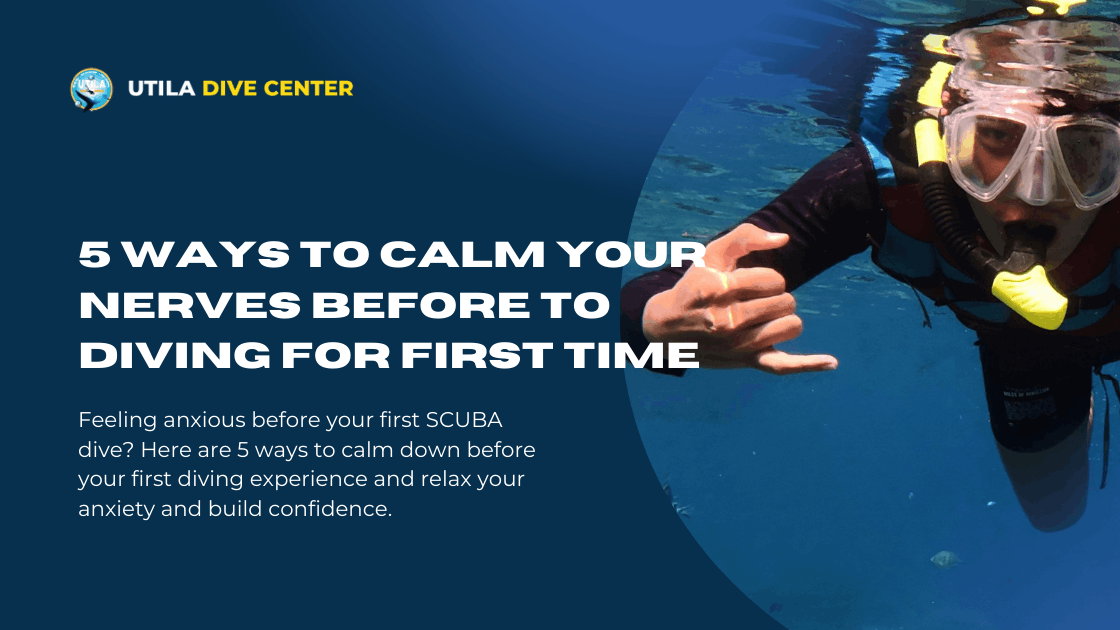
5 Ways to Calm Your Nerves Before to Diving for First Time
Feeling anxious before your first SCUBA dive? Here are 5 ways to calm down before your first diving experience and relax your anxiety and build confidence.
Read more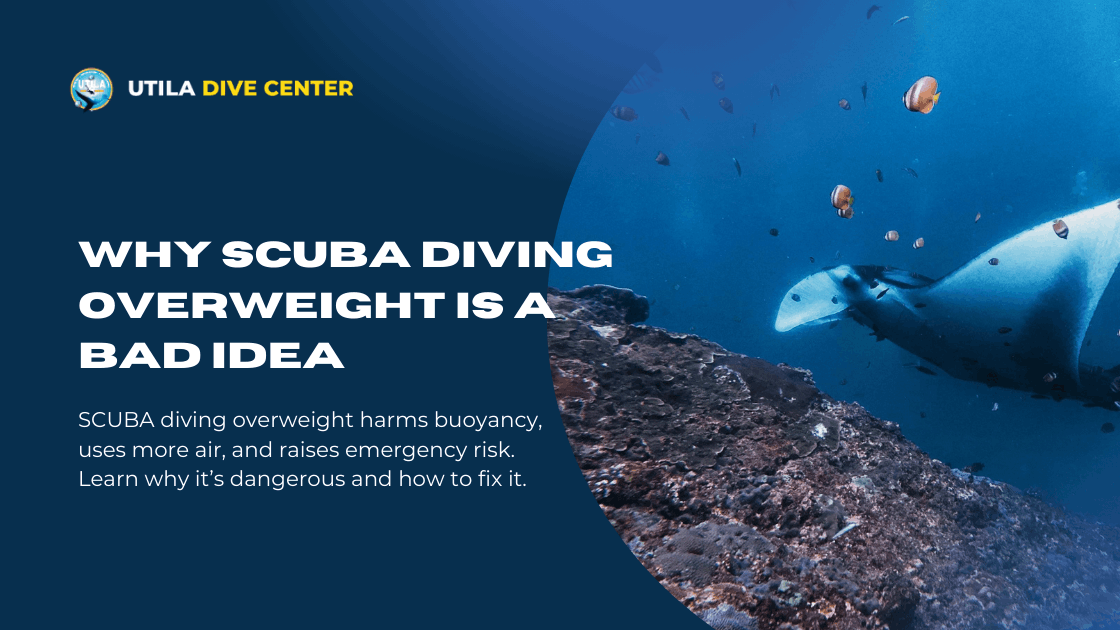
Why SCUBA Diving Overweight Is a Bad Idea
SCUBA diving overweight harms buoyancy, uses more air, and raises emergency risk. Learn why it’s dangerous and how to fix it.
Read more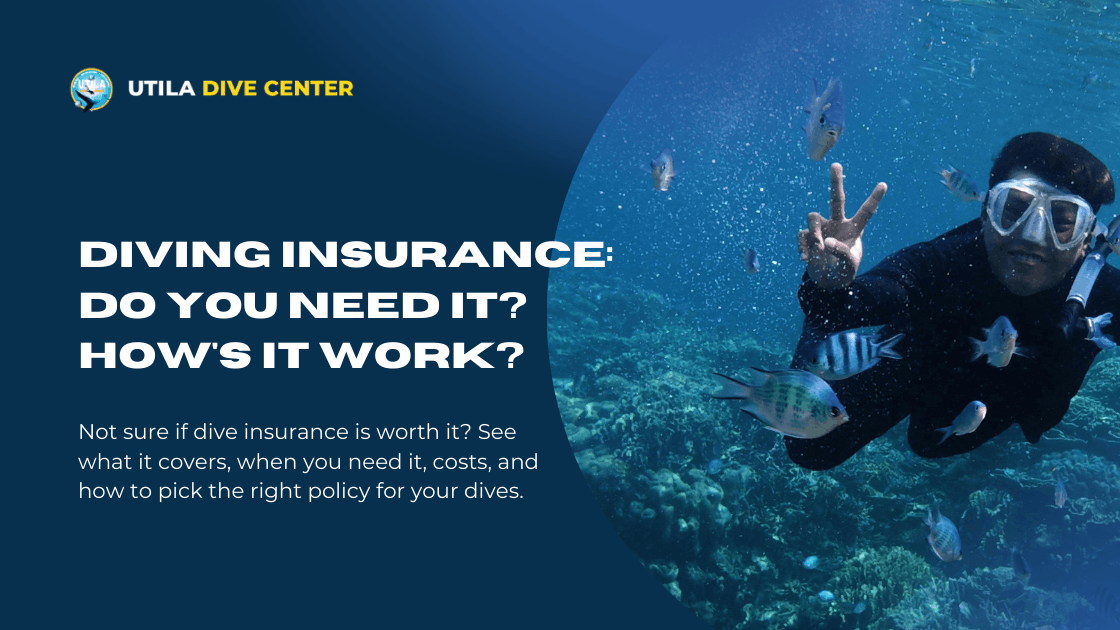
Diving Insurance: Do You Need It? How's It Work?
Not sure if dive insurance is worth it? See what it covers, when you need it, costs, and how to pick the right policy for your dives.
Read more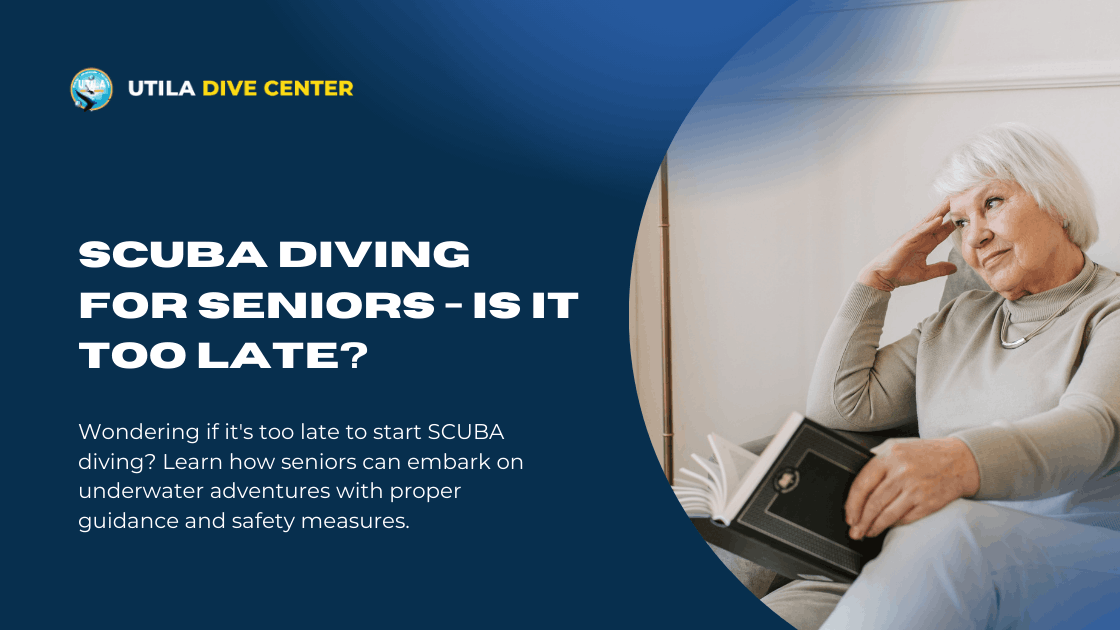
SCUBA Diving for Seniors - Is It Too Late?
Wondering if it's too late to start SCUBA diving? Learn how seniors can embark on underwater adventures with proper guidance and safety measures.
Read more